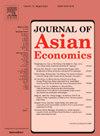The impact of the COVID-19 pandemic on sovereign debt default risk
IF 3.4
3区 经济学
Q1 ECONOMICS
引用次数: 0
Abstract
This paper investigates the impact of the COVID-19 pandemic on sovereign debt default risk using traditional and machine learning models. To reduce the pandemic’s impact and recover the economy, many governments implement loose fiscal and monetary policies, which leads to a dramatic growth in worldwide debts, further increasing sovereign debt default risks. Therefore, we construct a comprehensive framework to explore the pandemic’s impact on sovereign debt defaults. First, we compare the results of traditional models and the Random Forest model, and find that the Random Forest model performs the best. Then, we evaluate the importance of influencing factors, and analyze the pandemic’s impact on sovereign debt defaults. We find that the COVID-19 pandemic decreases the debt repayment capacities of developing economies, especially for countries with precarious fiscal positions and inadequate international reserves. Conversely, for developed economies with sustained macroeconomic despondency and high debt burdens, the pandemic may increase sovereign debt arrears. Finally, we predict the global sovereign debt defaults in 2021. This paper provides in-depth insights into the risk management of sovereign debt default.
新冠肺炎疫情对主权债务违约风险的影响
本文使用传统模型和机器学习模型研究了COVID-19大流行对主权债务违约风险的影响。为减轻疫情影响和恢复经济,许多国家政府实施宽松的财政和货币政策,导致全球债务急剧增长,进一步增加了主权债务违约风险。因此,我们构建了一个全面的框架来探讨疫情对主权债务违约的影响。首先,我们比较了传统模型和随机森林模型的结果,发现随机森林模型表现最好。然后,评估影响因素的重要性,并分析疫情对主权债务违约的影响。我们发现,2019冠状病毒病大流行降低了发展中经济体的偿债能力,尤其是财政状况不稳定、国际储备不足的国家。相反,对于宏观经济持续低迷和债务负担沉重的发达经济体,疫情可能会增加主权债务拖欠。最后,我们预测2021年全球主权债务违约。本文对主权债务违约的风险管理提供了深入的见解。
本文章由计算机程序翻译,如有差异,请以英文原文为准。
求助全文
约1分钟内获得全文
求助全文
来源期刊

Journal of Asian Economics
ECONOMICS-
CiteScore
4.70
自引率
9.40%
发文量
90
期刊介绍:
The Journal of Asian Economics provides a forum for publication of increasingly growing research in Asian economic studies and a unique forum for continental Asian economic studies with focus on (i) special studies in adaptive innovation paradigms in Asian economic regimes, (ii) studies relative to unique dimensions of Asian economic development paradigm, as they are investigated by researchers, (iii) comparative studies of development paradigms in other developing continents, Latin America and Africa, (iv) the emerging new pattern of comparative advantages between Asian countries and the United States and North America.
 求助内容:
求助内容: 应助结果提醒方式:
应助结果提醒方式:


